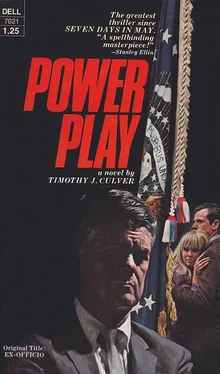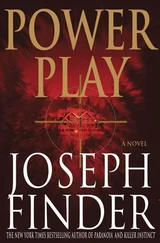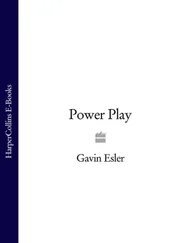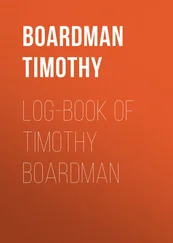Paris? She hadn’t been told anything about this. Had the Chinese managed to re-establish contact after all? Was it the Chinese and not Wellington’s men he’d seen today?
No, it couldn’t be, they would surely have told him the truth about her own feelings and how much the family knew and all the attempts to stop him from going. Or would he be playing his own double game now, pretending to be in ignorance so he could get away from them after all?
She had to see Robert, she had to find out what was going on.
Bradford was saying, “Edward’s gone back, hasn’t he?” Meaning Edward Lockridge, Sterling’s son, Howard’s brother, who had come home from his diplomatic post in Paris for Elizabeth’s funeral, where he had seemed a much older and sadder man than the one who had so endlessly and comically subdivided Paris at Carrie Gillespie’s last June.
“I think so,” Evelyn said. “They’d left Eddie, Jr., at Carrie’s place, I think they wanted to get him off her hands as soon as possible.”
“Why didn’t they bring him home for his grandmother’s funeral?”
There is comedy somewhere in any situation, no matter how grim. Straight-faced, Evelyn said, “He refuses to set foot on American soil till we change our foreign policy.”
Bradford snorted. “I can hardly wait to talk to that young man.”
Evelyn said, “Are you sure they want you to go to Paris? Do they speak English very well?”
“Perfectly. Why would they send agents here who didn’t speak the language?”
“Still—” She was trying to understand it, and failing. “Did they say it was tentative?”
“Not at all. Definite. They wanted to know if I could be ready in a week. I told them I could be ready this afternoon.”
“You’ll have to have approval, won’t you? From the State Department or somebody?”
“Approval?” The word seemed to offend him, returned to him that touch of aloof arrogance that was a recent character trait. “They like me to check in with them,” he said, “to keep them informed of my movements, but I wouldn’t exactly call it approval.”
“Still, you should do it this time, shouldn’t you? To keep them from getting suspicious.” And to give somebody an opportunity to keep it from happening. Paris? How could the family protect him in Paris?
“Oh, of course I will,” he said. “I’ll go through all the usual formality. Right up till the moment I disappear.” And he beamed, like a man who knows a wonderful joke.
“That’s good.”
“See, the idea is, I’m taking a winter vacation, a family trip. I’ll be visiting my nephew and my old friend Carrie Gillespie.”
“Your old friend? You hate Carrie.”
Bradford smiled his admission during his denial: “I don’t hate Carrie, I don’t hate any registered voter, never have. She’s a little sloppy for my taste, that’s all.”
“She’s happy,” Evelyn said, and at once regretted it.
But again Bradford put his own interpretation on her words, saying gently, “I know, Evelyn. You’re thinking of Dinah. But you’re right to leave her here, and it doesn’t really have to be forever.”
“I know. That’s all right now, I’m used to that.”
A maid came quietly into the room. “Excuse me. Mr. Lockridge? There’s a reporter on the telephone.”
Bradford frowned. “Did he say what it was about?”
“Yes, sir. He wanted a statement about Mr. Chatham’s death.”
Frown deepening, Bradford shook his head. “Tell him I’ve already made my statement, and that’s it. I have nothing further to say.”
“Yes, sir.” She departed, as quietly.
Grumbling at the interruption, Bradford said, “I’ll talk all day about politics, but not for thirty seconds about murder. Where are they when I have something germane to say about the world around us? I’m no Philo Vance.”
“They’ll listen soon,” Evelyn said, knowing her words were cruel beneath the surface kindness but unable to find anything else to encourage him with.
“Yes, they will,” he said grimly. “Excuse me, Evelyn, I have phone calls to make and letters to write. If we’re going to leave here a week from today, I have to get things organized.”
Was it a game they were playing with him, to keep him content a while longer? It would be like Wellington — who had turned the killing of Earl Chatham into the complication of a burglary done by people who expected the house to be empty during the funeral — to come up with this sort of scheme. Get Bradford excited about Paris for a few days, then start postponing that until he got irritable and impatient again. Then come up with another plan, another definite date, to be followed by another series of postponements.
Why did all these kindnesses have to be so cruel beneath the surface?
She said, “You go on, then. I believe I’ll take a drive.”
“Fine,” he said, already distracted by thought of the preparations to be made.
By now, Evelyn thought of Robert’s apartment as an extension of her own home, so she didn’t knock on the door, but simply opened it and stepped in, just in time to see Robert pacing across the open middle of the floor, and to hear him say, “... tell Evelyn—” before he caught sight of her and abruptly stopped both his pacing and his sentence. He stood flatfooted, looking for just a second bewildered, as though he hadn’t expected her to come to this place.
Tell Evelyn about this Paris business. She took it for granted that was the way the sentence would have ended, and thought no more about it, mostly because her mind was distracted by the other people she now saw in the room.
There were four of them, and they were all looking at her. Two, Howard and Gregory, she’d half-expected to find here, but the other two were a complete surprise. Joe Holt, sitting on one of the wooden chairs over by the kitchen-closet, was looking as grim and troubled as she’d ever seen him. By contrast, Wellington, standing in the far corner, looked even more uninvolved and remote than usual.
It was Joe’s expression that made her leap to the conclusion that Bradford was going to die. The idea entered her mind complete with all its circumstantial evidence intact; Joe’s presence here and his long face, the business about a trip to Paris, even Wellington being here. If Joe had made a new diagnosis, if it seemed to him now that Bradford was going to deteriorate very rapidly and die quite soon, he would want to be the one to tell her about it himself. And if it were true, then why not give Bradford a nonexistent trip to occupy his mind during his last days (One week! Could it be that soon?) And Wellington would be here to see to it that Bradford’s final days passed with no break in the ring of secrecy and security surrounding him.
She was so immediately convinced that her guess was right that she hesitated to ask any questions, wanting to hold off confirmation as long as she possibly could. She backed against the door, to close it and then to help support her (her legs felt strange, uncertain), and she kept looking at Joe because she knew he would be the first to speak.
But he wasn’t. Robert spoke first, coming toward her with one hand out, concern on his face, saying, “Evelyn? What’s the matter?”
He was asking her the question she should be asking him (except that she’d guessed), and the reversal confused her and kept her from saying anything. She merely frowned at him, trying to understand.
He touched her arm. “Are you going to faint?”
“He isn’t going to die?”
Did people look at each other in the background? Robert, still frowning at her, said, “Who? Bradford? Of course not. What gives you the idea Bradford’s going to die?”
Читать дальше












